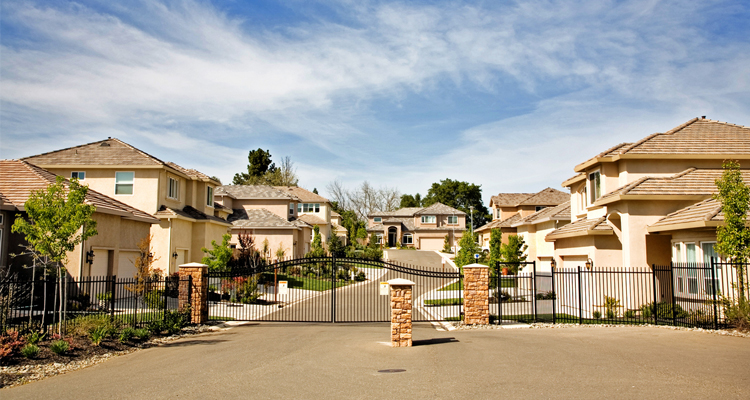WHAT ARE THE PROS AND CONS OF BUYING PROPERTY IN A GATED COMMUNITY ?
ooba homeloans responds

Gated communities present a new way of living; the next step from the suburbs of old. For whatever reason, people who share a gated residential area seem to have a stronger sense of community than people who share a street. Perhaps it’s the sense of autonomy, and the feeling of being “separate” from the rest.
According to data gathered by Lightstone, around one in 10 South Africans choose luxury gated communities when making a residential property purchase. Gated communities provide many of the benefits of communal living, while still respecting people’s private property rights, thereby allowing inhabitants to enjoy the best of both worlds.
Gated communities: Pros and cons
So are these gated communities the way of the future? Only time will tell, but for now, let’s look at the pros and cons of buying property in a gated community.
Pro: Increased security
Gated communities usually employ 24-hour security guards, are equipped with camera surveillance and controlled access, and ensure the maintenance of walls and fences. Many will also erect speed bumps to restrict driving speed, and there’s likely to be a low traffic volume anyway. All in all, they provide a safer and more family-friendly environment.
Pro: Access to amenities
Many gated communities are built around shared access to certain facilities. For example, some are built on golf courses, while others have access to hiking and cycling trails. Some are even constructed on equestrian estates. Shared amenities may include laundromats, walking trails, swimming pools, or perhaps even a tennis court. Many such communities even provide organised activities, and child-minding services.
An increasing amount of new developments, whether they be apartment blocks or gated residential areas, are incorporating modern conveniences into their design.
Pro: Collaborative ownership
Being able to share the cost and responsibility of maintaining a property has its perks, although the extent to which it will be shared depends on the type of ownership. Properties within a gated community can be either full title / freehold (meaning you own the building and the land it’s built on) or sectional title (meaning you own a unit within a complex or development).
If you purchase sectional title within a gated community, you become part of the body corporate, which consists of all the property owners within the community. The body corporate is responsible for administration and maintenance of the communal elements of the property, which may include security, gardens and swimming pools. This may limit your flexibility as a homeowner, but it also alleviates some of the burdens of homeownership.
“Sectional titles may remove some the responsibility of having to pay individually for building insurance, and for the upkeep of the communal areas within the complex, but you should check exactly what that building insurance covers, and what it does not,” says Rhys Dyer, CEO of ooba home loans, South Africa’s largest home loan comparison service. He also notes that the popularity of these homes has grown over the last decade, because they tend to be more cost-effective.
Con: Gated community laws
The flip side of collaborative ownership is that you will have to abide by the rules and regulations of the body corporate. Ensure that you’re fully aware of what those rules and regulations are, and whether they are compatible with your lifestyle, before making an offer to purchase. Important things to take note of include whether the community is pet-friendly or child-friendly,
and what the policy is on noise levels.
Dyer advises prospective owners of sectional-title properties to scrutinize the budget, the financial statements of the body corporate and the minutes of the meetings held by the trustees of the body corporate.
Con: Higher costs
The exclusivity of gated communities means that properties will have a higher value, which means the buyer will be paying a higher price up front. This is obviously offset by the fact that the buyer is receiving a higher-value property, which will benefit them in the long run.
Of course, there’s also the contributions that a sectional title owner will be expected to make to the ongoing costs of managing and maintaining the shared property.
Gated communities as an investment opportunity
The higher property value in a gated community is an advantage when you take into account the resale value. Gated communities are usually well-maintained, with advanced security measures and lifestyle benefits.
So purchasing property in a gated community makes sense as a long-term investment, though you’ll need to take into account the size of the unit, as research by data group Lightstone shows that the average price increase fluctuates according to the number of bedrooms. For example, properties with only two bedrooms are sold at a higher price in non-gated residential areas; whereas homes with five bedrooms increase in average price of up to 109.4% in gated Communities.
Such factors need to be taken into account when considering gated communities as an investment opportunity, as do the rules, regulations and financial responsibilities of being a member of the body corporate. As Dyer points out, it’s important to “check everything in the scheme that you are buying into is sound and that the conduct rules are acceptable to you before signing on the dotted line”.
To make the home-buying process easier, you can obtain the services of South Africa’s leading home loan comparison service, ooba home loans. They offer a range of home loan calculators that will help you determine what you can afford. You can start with ooba home loan’s free, online prequalification tool, the ooba Bond Indicator. Then, once you’ve found a home that meets your requirements, you can apply for a home loan.
